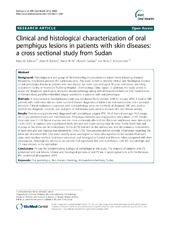Clinical and histological characterization of oral pemphigus lesions in patients with skin diseases: a cross sectional study from Sudan
Suliman, Nada M.; Åstrøm, Anne Nordrehaug; Ali, Raouf Wahab; Salman, Hussein; Johannessen, Anne Christine
Peer reviewed, Journal article
Published version
Permanent lenke
https://hdl.handle.net/1956/7585Utgivelsesdato
2013-11-21Metadata
Vis full innførselSamlinger
Originalversjon
https://doi.org/10.1186/1472-6831-13-66Sammendrag
Background: Pemphigus is a rare group of life-threatening mucocutaneous autoimmune blistering diseases. Frequently, oral lesions precede the cutaneous ones. This study aimed to describe clinical and histological features of oral pemphigus lesions in patients aged 18 years and above, attending outpatient’s facility of Khartoum Teaching Hospital - Dermatology Clinic, Sudan. In addition, the study aimed to assess the diagnostic significance of routine histolopathology along with immunohistochemical (IHC) examination of formalin-fixed, paraffin-embedded biopsy specimens in patients with oral pemphigus. Methods: A cross-sectional hospital-based study was conducted from October 2008 to January 2009. A total of 588 patients with confirmed disease diagnosis completed an oral examination and a personal interview. Clinical evaluations supported with histopathology were the methods of diagnosis. IHC was used to confirm the diagnosis. Location, size, and pain of oral lesions were used to measure the oral disease activity. Results: Twenty-one patients were diagnosed with pemphigus vulgaris (PV), 19 of them (mean age: 43.0; range: 20–72 yrs) presented with oral manifestations. Pemphigus foliaceus was diagnosed in one patient. In PV, female: male ratio was 1.1:1.0. Buccal mucosa was the most commonly affected site. Exclusive oral lesions were detected in 14.2% (3/21). In patients who experienced both skin and oral lesion during their life time, 50.0% (9/18) had oral mucosa as the initial site of involvement, 33.3% (6/18) had skin as the primary site, and simultaneous involvement of both skin and oral mucosa was reported by 5.5% (1/18). Two patients did not provide information regarding the initial site of involvement. Oral lesion activity score was higher in those who reported to live outside Khartoum state, were outdoor workers, had lower education and belonged to Central and Western tribes compared with their counterparts. Histologically, all tissues except one had suprabasal cleft and acantholytic cells. IHC revealed IgG and C3 intercellularly in the epithelium. Conclusions: PV was the predominating subtype of pemphigus in this study. The majority of patients with PV presented with oral lesions. Clinical and histological pictures of oral PV are in good agreement with the literature. IHC confirmed all diagnoses of PV.
Utgiver
BioMed CentralTidsskrift
BMC Oral HealthOpphavsrett
Copyright 2013 Suliman et al.; licensee BioMed Central Ltd.Nada M Suliman et al.; licensee BioMed Central Ltd.

